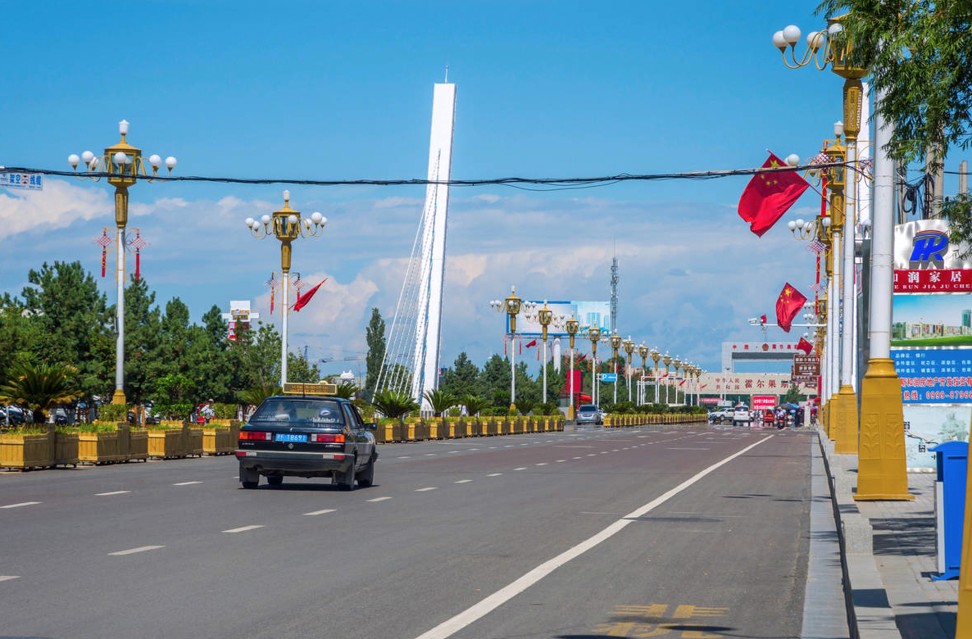
China’s film companies flee Xinjiang tax haven in wake of Fan Bingbing evasion scandal
A tightening of rules in the once tax-free city of Khorgos and Beijing’s crackdown on the entertainment industry has seen production houses running for the hills
More than 100 Chinese television and film production companies have applied to relocate away from a remote city in Xinjiang amid a wide-ranging investigation into tax evasion in the entertainment industry and suggestions they were no longer free to shoot in the troubled region.
The exodus from Khorgos, close to China’s border with Kazakhstan, started in June and coincided with the start of an inquiry into Fan Bingbing, the nation’s highest-paid actress. Fan, whose own production company was registered in the city, was detained and later ordered to pay nearly 884 million yuan (US$127.9 million) in fines and unpaid taxes.
Fan Bingbing whistle-blower Cui Yongyuan dismisses Chinese police’s ‘missing’ claim, accuses them of ignoring death threats
A woman who works for a small Chinese film production company, who asked not to be named, said the Fan tax scandal had had a “really huge” impact on Khorgos.
“I had [industry] friends who went to Khorgos and told us not to film there in future, because we were likely to encounter difficulties,” she said.
“Tax avoidance in China is a huge problem. Any company can legally avoid tax [through loopholes … but] as this is on such a massive scale and someone leaked it, the government is now seriously investigating it.”
Khorgos, which has a population of just 100,000, was designated a special economic development zone by the state government in 2011 because of its position along the route of the “Belt and Road Initiative” – President Xi Jinping’s pet trade and infrastructure development plan. It is also the world’s biggest dry port and serves as a gateway to central Asia.
To attract companies to the zone, local authorities offered all new arrivals a zero per cent corporate income tax rate for their first five years. The move worked and a flood of companies, including hundreds from the entertainment sector, headed west.
Fan Bingbing is not the first Chinese film star to fall from grace
The film industry source estimated there were “more than a thousand” shell companies from the culture and entertainment industries registered in Khorgos, but they did little in the way of swelling the city’s coffers.
“To be honest, there was no beneficial impact on the local economy,” she said. “They [incoming companies] enter the area, reap the financial rewards and transfer the money out. They don’t boost the income of the locals and are only there for the tax breaks, which are good for the companies but don’t benefit the government.”
Beijing in June pledged to crack down on tax evasion in the entertainment industry and actors’ overinflated salaries, but the investigation in Khorgos had been going on since January, the source said.
And the tightening of tax loopholes had had a detrimental impact on companies from other industries that were operating legitimately in the city, she said.
“It’s very unequal: companies who are actually trading there have complained to the government that they are lawfully conducting business and the policies targeting entertainment firms should not apply to them.
“But as the government has only limited human resources … they have no choice but to impose a ‘one size fits all’ policy.”
She said also that staff from her company travelled to Urumqi, capital of the Xinjiang Uygur autonomous region, last month for a shoot but were told by local government officials not to film in Khorgos because the city was “in turmoil”.
Chinese actress Fan Bingbing tells fans she is ‘ashamed, guilty’ as she gets US$129 million tax bill
According to a recent report by China’s state broadcaster CCTV, among those who have applied to deregister their companies from Khorgos are the director Feng Xiaogang and actress/director Xu Jinglei.
The report said also that three of the six main production companies behind China’s 2017 blockbuster Wolf Warrior 2 were registered in the city, as well as many of those that worked on other recent box office hits, including Big Fish & Begonia and Chongqing Hot Pot.
It is an open secret in the entertainment industry that many celebrities funnel their earnings into studios or production houses – which pay just 6 per cent corporate tax – to reduce their liabilities. The top rate for personal income tax in mainland China is 45 per cent.
Shares in China’s top film and entertainment companies have plunged since the government announced its investigation in June, with Beijing Enlight Media stocks down by a third and Huayi Brothers down 40 per cent.



